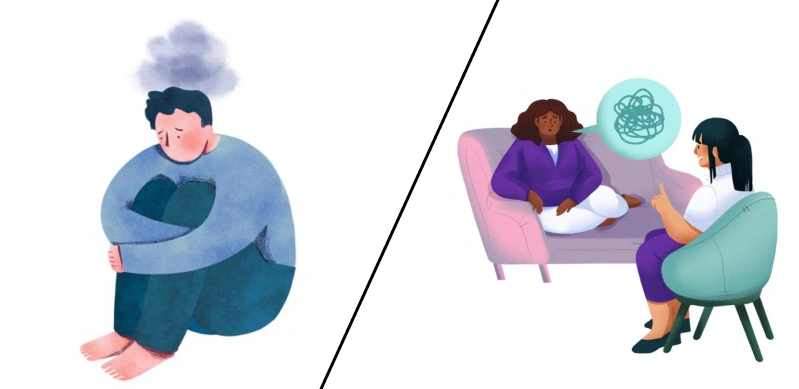Seasonal Affective Disorder (SAD): More Than the Winter Blues!

As the days grow shorter and the winter chill sets in, it’s common to feel a bit sluggish or down. For some, however, these feelings run deeper, signaling Seasonal Affective Disorder (SAD). Often dismissed as just the “winter blues,” SAD is a complex form of depression that can affect individuals during specific times of the year. What’s even more surprising? SAD can also occur during the summer months!
What is Seasonal Affective Disorder (SAD)?
Seasonal Affective Disorder is a type of depression linked to changes in seasons. It’s most common during the fall and winter months when daylight hours decrease, but it can also occur in the spring and summer. Winter-onset SAD is the more prevalent form, and its symptoms can persist from late autumn to early spring.
Common Symptoms of SAD
SAD affects people differently, but common symptoms include:
- Loss of interest in activities you once enjoyed.
- Changes in sleep patterns, especially oversleeping.
- Persistent fatigue and low energy levels.
- Difficulty concentrating or staying focused.
- Intense cravings for carbohydrates, often leading to weight gain.
- Social withdrawal and isolation.
If these symptoms sound familiar and consistently appear during specific times of the year, it may be time to consider the possibility of SAD.
What Causes Seasonal Affective Disorder (SAD)?
Seasonal Affective Disorder is complex, and its causes can vary from person to person. While the exact mechanisms are not fully understood, researchers have identified several biological, environmental, and psychological factors that may contribute to SAD. These factors often work together to disrupt your body’s natural rhythms and brain chemistry, leading to symptoms of depression.
Here are the primary causes linked to SAD:
- Reduced Sunlight Exposure: The decrease in sunlight during fall and winter months disrupts your circadian rhythm, which acts as your internal clock. This disruption can lead to feelings of lethargy and depression.
- Serotonin Deficiency: Sunlight influences serotonin, a neurotransmitter that regulates mood. Lower serotonin levels during darker months may trigger depressive symptoms.
- Melatonin Overproduction: Longer nights can cause the body to produce excessive melatonin, a hormone that regulates sleep. Increased melatonin levels may result in excessive sleepiness and low energy.
- Vitamin D Deficiency: Reduced exposure to sunlight can lower Vitamin D production, which is essential for serotonin synthesis. This deficiency may further exacerbate mood-related symptoms.
- Genetic Predisposition: A family history of depression or other mood disorders can increase the likelihood of developing SAD.
- Preexisting Mental Health Conditions: Individuals with existing depression or bipolar disorder may find their symptoms worsening seasonally, particularly during the winter months.
- Environmental Factors: Living in regions with extended winters or fewer daylight hours increases the risk of SAD. Geographic location plays a significant role in the disorder’s prevalence.
- Psychological Stress: Seasonal transitions can also bring changes in routines, added stress from holidays, or feelings of isolation, which may contribute to the onset of SAD.
By understanding the root causes of Seasonal Affective Disorder, individuals and healthcare providers can work together to develop effective strategies for treatment and prevention.
Treatment Options for SAD
The good news? Seasonal Affective Disorder is manageable, and effective treatment options are available. Here are some of the most recommended approaches:
1. Light Therapy
Light therapy involves daily exposure to a lightbox that mimics natural sunlight. Spending 20–30 minutes each morning under a lightbox can significantly improve energy and mood.
2. Medication
Antidepressants, particularly Selective Serotonin Reuptake Inhibitors (SSRIs), can help regulate mood and manage depressive symptoms.
3. Psychotherapy
Cognitive-Behavioral Therapy (CBT) focuses on identifying negative thought patterns and creating strategies to manage them. CBT is especially effective for those dealing with SAD.
4. Lifestyle Adjustments
- Exercise: Regular physical activity boosts endorphins and enhances energy.
- Healthy Diet: A balanced diet with limited processed carbs can stabilize energy levels.
- Maximize Natural Light: Open curtains, sit near windows, or spend time outdoors when possible.
5. Vitamin D Supplements
Vitamin D deficiency is common in individuals with SAD, especially during darker months. Taking supplements may help improve symptoms.
How Perfect Balance Psychiatric Services Can Help?
At Perfect Balance Psychiatric Services, Dr. Siddiki specializes in diagnosing and treating Seasonal Affective Disorder. Whether you’re facing winter-onset or summer-onset SAD, our comprehensive approach ensures tailored treatment plans designed to bring balance back into your life.
Our services include:
- Evidence-based therapies.
- Personalized medication management.
- Ongoing support to help you navigate the darker months with resilience.
Contact Us Today!
Are you or someone you love struggling with Seasonal Affective Disorder or other mental health challenges? Don’t hesitate to seek help. At Perfect Balance Psychiatric Services, we are dedicated to guiding you toward a healthier, happier, and more balanced life.
